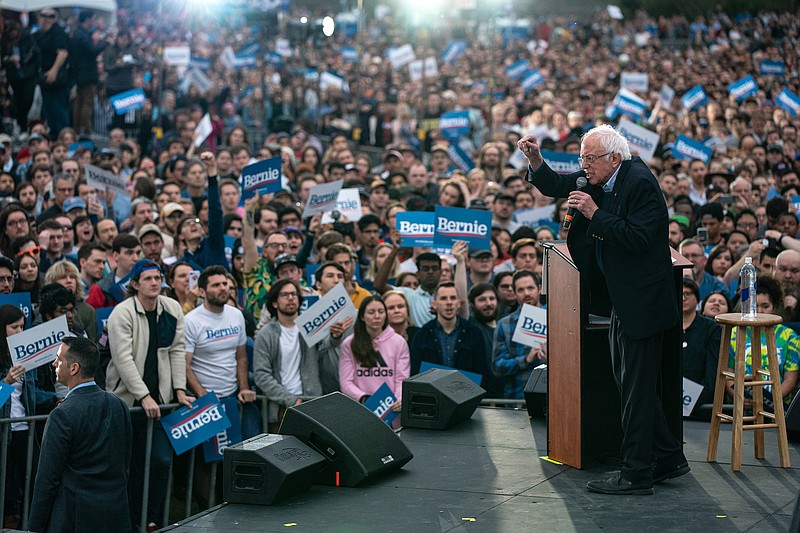"The longer the establishment is divided, the more difficult it is to stop him from winning primaries and accumulating delegates. He will need to broaden his appeal - something that he has shown no inclination or ability to do."
"The party will have before it a nominee unlike any it's ever had before and one whose personal polarization could make him the most loved and hated candidate ever in a presidential race."
The above statements were written not about Democratic presidential front runner U.S. Sen. Bernie Sanders, I-Vermont, as they might be, but four years ago about the upstart candidacy of Republican New York businessman Donald Trump.
It was late February 2016, and establishment Republicans hadn't hit the panic button yet before the March 1 Super Tuesday primaries, but they were getting nervous. Many of their arguments ran along the same lines as those today discussing Sanders.
Sure, Trump led in national polls, but two-thirds of Republican voters wanted somebody else but him.
Looking for an alternative, establishment Republicans noted Bill Clinton did not win any of his first four primary/caucus battles in 1992 and won only one of the first 10. Obama didn't win three of his first six contests in 2008, and John McCain did not win four of his first six the same year.
Trump did not do as well as the primary winners did in New Hampshire or South Carolina in 2008 or 2012.
Also, there was this. Four years ago at this time, Trump supporters were talking about a potential change of Republican National Committee rules that would give him the nomination if he had a plurality of primary votes but not a majority.
In the Democratic debate in Nevada last week, the candidates were asked if no candidate had the number of votes needed to clinch the nomination on the first ballot, could they support the candidate with the most votes, or should they let the process play out? All the candidates but one suggested the process should play out. Sanders said the candidate with the most votes should prevail.
Today, days after a landslide win in the Nevada primary, the Vermont democratic socialist is the candidate with the most votes.
Ahead of establishment Republicans four years ago in tearing their hair, Democrats are in full panic mode. They're worried with Sanders heading the national ticket, they're looking at an historic election loss, at perhaps the loss of their House majority and at the re-election of the man they have impeached, refused to work with and hate with the heat of a fiery furnace.
The problem is none of Sanders' top rivals wants to get out of the race. They'd like to force such a division of votes that, at a minimum, a second ballot at the national convention where anything could happen would be necessary. So they keep touting their bona fides, hinting they still have a path to first-ballot victory and splitting the anybody-but-Bernie vote.
A memo last week from late-to-the-party Mike Bloomberg warned, "If Joe Biden, Pete Buttigieg, and Amy Klobuchar remain in the race despite having no path to appreciably collecting delegates on Super Tuesday (and beyond), they will propel Sanders to a seemingly insurmountable delegate lead."
The candidacies of Buttigieg and Warren quite naturally objected and suggested Bloomberg - and his personal spending of hundreds of millions of dollars - drop out, instead.
While most of the other candidates want to bring back a semblance of the policies of Barack Obama, the most liberal president in U.S. history, Sanders has something else in mind. Though he has begun to play down the socialist half of his democratic socialist tag, he has a revolution in mind and even touts it in his campaign.
If all of Sanders' plans were to be implemented, they would cost an estimated $97.5 trillion over the next decade, the 10-year budget deficit would be nearly $90 trillion, and total federal government spending would be 70% of the country's gross domestic product.
Oh, the rich would pay more for sure, but he has admitted his plans call for taxes to be raised on all Americans making more than $29,000 per year. Plus, he wants to put in place a 4% payroll tax on employees and a 7% payroll tax on employers.
Of course, employer-provided health care would go away in a Medicare-for-all system, and out with it would go the Health Savings Accounts used by some 25 million Americans.
Those are just a few of the Sanders plans that desperate left-wing pundits are trying to soften in assuring us that, really, he's not all that radical and that his plans are no more extremist than those in many Western European countries.
Four years ago, the establishment Republicans couldn't stop Trump. This year, the establishment Democrats understand that not stopping Sanders will put them in peril. They're just not sure how to do it.
